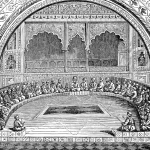Men applying to study for Holy Orders are familiar with the psychological exams you have to take.
Here are the impressions of one man, after taking the test for the diaconate:
One interesting feature of the exam is that the examiner (a clinical psychologist) had to review the self-narrative with me, and for a fixed list of questions required me to answer them again orally. This was not for all the questions, and he explained afterwards that this list had been designated by the archdiocese for special treatment.
I was not surprised by some of the questions that were asked twice in this fashion:
1) Have you ever abused children?
2) Do you have problems with drugs?
3) Have you ever had problems with mental illness?
One question did surprise me (though perhaps it should not have) since all the men in my class have been married for at least 15-20 years:
4) Are you a homosexual?
One question was worded oddly and might have used more amplification:
5) Do you have any sexual addictions?
As I pondered the questions on the drive home, however, what struck me was the questions there were not asked. First, there was nothing directly related to domestic violence. I imagine that a careful reading of the standardized personality tests, combined with the projective psychology tests, could discern the personality traits associated with an abuser. But I think that this would be a much more important question to bring to the fore than “are you gay,” especially given the prevalence of domestic violence in America. The question on abusing children was worded a bit more broadly, but in answering it the intent did seem to be pedophilia and not domestic violence.
This is closely connected with the second question that was missing: none of the highlighted questions touched on my motivations to become a deacon. Men are probably motivated by a number of different things: while we are all called to the same ministry, the Holy Spirit will prompt each of us differently. But there may also be baser motivations: a desire to hold a place prominence and power, the desire to be a cleric (and enjoy the benefits of clericalism), a need to be in control. Some of these are related to the traits of abusive men, particularly (if my understanding is correct) the need for control. Again, it may be that the standard personality tests can be used to screen for these problematic motivations, but I thought that this is an issue that should be more prominent in the testing. There was one written question about obedience and authority, but the intent was to determine if I had problems submitting to the authority of the bishop…
…The third question that was not asked may not be appropriate for a psychological exam, but given the very detailed sexual history that the self-narrative required, I did find it surprising that none of the questions asked about birth control use. There was one written question that asked generally “have you engaged in any sexual practices that the Church does not approve of” but this was not one of the questions that was foregrounded by oral questioning, and the examiner passed over this question as he was reviewing my answers. (Besides the required questions, he did stop frequently and engage me on other questions, mostly to clarify my answer or to elicit further information.)
UPDATE: My pal Deacon Bill Ditewig has some analysis of all this, and offers the Headline of the Week: You Have to be a Little Crazy to be a Deacon
















